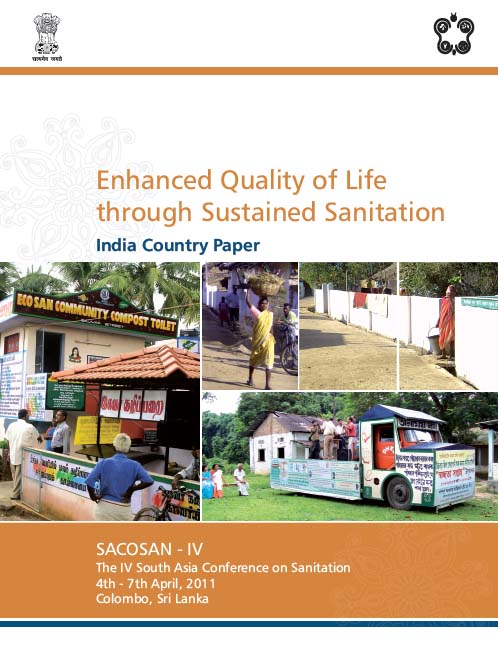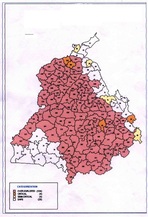/topics/society-culture-religion-and-history
Society, Culture, Religion and History
Intensive farming responsible for farmer suicides - Interview with Devinder Sharma with special focus on Odisha
Posted on 27 Jun, 2011 11:54 AM
Q: Odisha is not much known for farmers' suicide the way we hear it in Vidarbha, Andhra Pradesh etc. But of late such cases are being reported in the media. What's the reason?
A: When you look at the issue of farmers' suicide, it's an indication of the crisis that exists in the agriculture sector. This is linked to monoculture and intensive or industrial farming model that have been implemented in the country. Vidharbha for instance has been in the news on the issue of farmers' suicide mainly because there is one NGO namely Vidharbha Jan Andolan Samiti which regularly compiles the figures of farmers suicide and feeds to the media. Unfortunately there are no such NGOs elsewhere to do a similar job. So therefore we do not get the real picture of farmers distress in other areas where conditions are equally bad. If suppose this NGO also stops compiling suicide figures, our impression about Vidharbha as a suicide belt of India will also disappear. In other words, not only in Vidharbha, agriculture across the country is in a terrible crisis.
Ashwas process handbook - A planning and execution guide for participatory surveys of household water and sanitation
Posted on 25 Jun, 2011 04:31 PMThe handbook was created as a result of several organisations expressing their interest in conducting an exercise similar to ASHWAS. The purpose of this handbook is thus to serve as a template for those wishing to carry out a similar effort in the other parts of the country.
Mining havoc: Impact of mining on water resources in Goa - Article from Dams, Rivers and People
Posted on 25 Jun, 2011 02:02 PM
Pumping of water from Cavrem Sheikh Salim mine, severely lowering groundwater table in the village
Image courtesy: Sebastian Rodriguez, Mand Goa
Urgent solidarity appeal for victims of eviction of 15 families from Lamphelpat wetlands in Manipur, NE India on 6 June 2011
Posted on 25 Jun, 2011 01:27 PM
Date of Incident: 6 June 2011 at around 7 A.M
Place of Incident: Yaipha Leikai, Lamphelpat, Under Lamshang Assembly Constituency, Imphal West District, Manipur, India
Victims/Community Affected: 15 Households, 81 persons belonging to the Meitei People of Manipur
The displaced victims are mostly women, children and elderly people
Event Description:
On 6 June 2011, at least fifteen (15) houses of Yaipha Leikai village, Lamphelpat Wetland near Employment Exchange, Imphal West District, Manipur in India’s North East had been destroyed by Manipur Police from the Lamphel Police Station under the orders of the Government of Manipur on 6 June 2011 as a means to evict the villagers to make way for the Government plan for building the National Institute of Technology (NIT) complex and a water body at Lamphelpat wetlands.
Prior to the eviction, an order issued by the Sub Divisional Officer, Lamphel, Imphal West on 3 June 2011 was served to the villagers of Yaipha Leikai only on Sunday, the 5 June, 2011 around 10 a.m in the morning asking them to dismantle their houses the same day before 5 in the evening. The villagers were completely taken by surprise as most of the senior household occupants were off to work in Lamphelpat Wetlands for fishing and many went out to earn as daily labourers. The eviction drive was carried out on 6 June 2011, the next day from around 7 a.m in the morning. The eviction process was overseen by State Works minister K Ranjit, PDA chairman Kh Loken among other officials of different departments and police officials of Lamphel Police Station, Imphal West District. The eviction was carried out by using earthmovers and other heavy machineries despite the angst of the residents, who have resided in the area for more than four decade.
Assessment study of impact and sustainability of Nirmal Gram Puraskar – A report by CMS Environment
Posted on 24 Jun, 2011 11:02 PMNGP was initiated in Oct 2003 to encourage Panchayati Raj Institutions (PRIs), block and districts to take up sanitation promotion, a post achievement, award-cum-fiscal incentive scheme. The eligibility criteria for the PRIs to receive NGP include: Gram Panchayats, Blocks and Districts, which achieve 100 per cent sanitation coverage in terms of: (1) 100 per cent sanitation coverage of individual households (2) 100 per cent school and anganwadis sanitation coverage (3) Free from open defecation and (4) Clean environment maintenance (liquid and solid waste management).
Enhanced quality of life through sustained sanitation - India country paper for South Asia Conference on Sanitation
Posted on 24 Jun, 2011 10:09 PM This India Country Paper on Enhanced Quality of Life through Sustained Sanitation was prepared for South Asia Conference on Sanitation (SACOSAN) IV held at Colombo, Sri Lanka in April, 2011.
This India Country Paper on Enhanced Quality of Life through Sustained Sanitation was prepared for South Asia Conference on Sanitation (SACOSAN) IV held at Colombo, Sri Lanka in April, 2011.
In rural sanitation, India’s flagship rural sanitation programme, the Total Sanitation Campaign (TSC), continues to be implemented with renewed vigour, and improvements in multiple facets of the programme. The TSC programme was given a further boost with the introduction of the Nirmal Gram Puraskar (NGP), an innovative incentive scheme for Gram Panchayats, Blocks and Districts. The rural sanitation sector has continued to receive increasing budgetary support.
Water crisis and water chaos in Punjab - An article by Umendra Dutt, Kheti Virasat Mission
Posted on 23 Jun, 2011 02:08 PM Last month Punjab has been declared as the over all best state in the country by India Today news magazine for the third conjunctive year. It is good to have a prize for Punjab and state government has immediately taken this as an opportunity to have publicity campaign for its achievement. But there is another side of the picture also which shows doom, distress and destruction is fast engulfing this land of five waters. It is a Water-Chaos in the Punjab.
Last month Punjab has been declared as the over all best state in the country by India Today news magazine for the third conjunctive year. It is good to have a prize for Punjab and state government has immediately taken this as an opportunity to have publicity campaign for its achievement. But there is another side of the picture also which shows doom, distress and destruction is fast engulfing this land of five waters. It is a Water-Chaos in the Punjab.
Call for entries for ‘Film Southasia 2011’ at Kathmandu – Apply by June 30, 2011
Posted on 23 Jun, 2011 11:48 AMThe goal of Film Southasia, an organisation within Himal Southasian magazine, set up in 1997 when the first edition of the festival of southasian documentaries was organised, is to popularise the documentary so that it entertains, informs and changes lives.
UN-HABITAT invites entries for Urban arts and design youth competition – Apply by June 28, 2011
Posted on 23 Jun, 2011 11:43 AM The United Nations Human Settlements Programme, UN-HABITAT, is the United Nations agency for human settlements. It is mandated by the UN General Assembly to promote socially and environmentally sustainable towns and cities with the goal of providing adequate shelter for all.
The United Nations Human Settlements Programme, UN-HABITAT, is the United Nations agency for human settlements. It is mandated by the UN General Assembly to promote socially and environmentally sustainable towns and cities with the goal of providing adequate shelter for all.
Threat of toxic residue leaks in Orissa, India in 2011 - Urgent action requested by Amnesty International
Posted on 23 Jun, 2011 11:32 AMOver 4,000 families in India face serious risk from threats of leaks from Vedanta's red mud pond as the rainy season begins in June. Levels within the pond have already risen, amidst reports of two leaks in the last two months, threatening the communities' safety, health and livelihoods.
On 5 April and 16 May 2011, following heavy rain, local communities in Orissa state reported leakages from the 28-hectare red mud pond, owned and operated by Vedanta Aluminium, through its walls, polluting local streams and creating anxiety among the communities at the downstream villages of Lanjigarh, Bundel and Basantpada.





